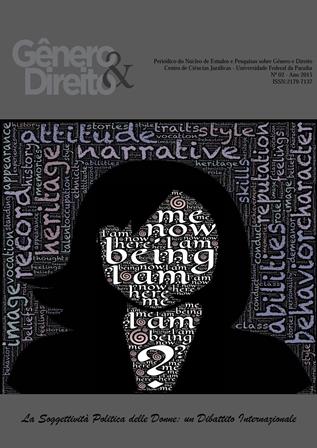THE 'MATERIALIST' BENT IN CONTEMPORARY FEMINIST THEORY
Palavras-chave:
biology, materialism, human and non-human animals, race, sex, gender, feminismResumo
Since the late eighties, feminist literature has produced a great number of contributions on the body. It has forgotten, however, its more properly biological dimension. Despite the desire to reconcile nature and nurture, this oversight has been encouraged by the fear of falling into some forms of essentialism and the difficult dialogue between social sciences and natural sciences. In recent years, however, some authors have tried to restore the body’s material dimension to center stage. This has happened because neuroscience and genomics have revived, in a more or less hidden way, a biological conception of race and sex. In this new context it has become more and more urgent to strive for an alliance between the natural sciences, the social sciences and feminism able to confront the challenges of the current phase of biocapitalism and biocolonialism. A new feminist materialism seems necessary to contrast the present form of reductionism, a molecular reductionism that decomposes the body into molecules, manipulable and exploitable bits of informational sequences that are transformable into “biovalue”. As Sarah Franklin maintains: “This instrumentalism has become inseparable from the capitalisation of life itself” (Franklin, 2000: 189).Downloads
Referências
Amhed, Sara (2008), “Open Forum Imaginary Prohibitions: Some Preliminary Remarks on the Founding Gestures of the ‘New Materialism’”, European Journal of Women Studies, 15, 1, 23-39.
Alaimo, Stacy (2000), Undomesticated Ground: Recasting Nature as Feminist Space. Ithaca (NY): Cornell University Press.
Alaimo, Stacy (2010), Bodily Natures. Science, Environment and the Material Self. Bloomington-Indianapolis: Indiana University Press.
Alaimo, Stacy, Hekman, Susan (eds. by) (2008), Material Feminisms. Bloomington-Indianapolis: Indiana University Press.
Alaimo, Stacy (2010), “Eluding Capture: The Science, Culture, and Pleasure of 'Queer' Animals”, in Mortimer-Sandilands, Catriona, Bruce Erickson, Bruce (eds. by,) (2010), Queer Ecologies. Sex, Nature, Politics, Desire. Bloomington-Indianapolis: Indiana University Press (kindle edition).
Allandale, Ellen (2007), “Gender and Health Status. Does Biology Matter?”, in Bendelow, Gillian, Birke, Lynda, Willams, Simon (eds. by), Debating Biology, Taylor & Francis [Formato Kindle].
Asberg, Cecilia (2010), “Biology is a Feminist Issue: Interview with Lynda Birke,” European Journal of Human Studies, 17, 4, 413-423.
Bagemihl, Bruce (1999), Biological Exuberance. Animal Homosexuality and Natural Diversity. New York: St. Martin’s Press.
Barad Karen (1998), “Getting Real: Technoscientific Practices and the Materialization of Reality”, differences: A Journal of Feminist Cultural Studies, 10, 2, 87-128.
Baron-Cohen, Simon (2004), The Essential Difference. London: Basic Books.
Birke Lynda (1999), “Bodies and Biology”, in J. Price, M. Shildrick (eds.by), Feminist Theory and the Body, Routledge, New York.
Birke Lynda (2000a), Feminism and the Biological Body. New Brunswick: Rutgers University Press (I 1999).
Birke, Lynda (2000b), “Sitting on the Fence: Biology, Feminism and Gender-Bending Environments”, Women’s Studies International Forum, 23, 5, 587-589.
Birke, Lynda (2007), “Feminism and the Biological”, n Bendelow, Gillian, Birke, Lynda, Willams, Simon (eds. by), Debating Biology, Taylor & Francis [Formato Kindle].
Birke, Lynda (2010), “Structuring Relationships: On Science, Feminism and Non-Human Animals”, Feminism and Psychology, 20, 3, 337-349.
Coole Diana, Frost Samantha (eds. by) (2010), New Materialisms. Ontology, Agency, and Politics. Durham-London: Duke University Press.
Donovan Josephine, Adams Carol J. (eds. by) (2007), The Feminist Care Tradition in Animal Ethics. New York: Columbia University Press.
Fine, Cordelia (2011), The Delusion of Gender: The Real Science Behind Sex Differences, London: Icon Books.
Germon, Jennifer (2009), Gender. A Genealogy of an Idea, New York: MacMillan, Palgrave.
Grosz Elizabeth (1994), Volatile Bodies. Toward a Corporeal Feminism. Bloomington-Indianapolis: Indiana University Press.
Haraway, Donna (1991), “A Cyborg Manifesto. Science, Technology, and Socialist-Feminism in the Late Twentieth Century”, in Haraway, Donna, Simians, Cyborgs and Women: The Reinvention of Nature, New York: Roultedge.
Haraway, Donna (1997), Modest_Witness@Second_Millennium.FemaleMan_Meets_OncoMouse: Feminism and Technoscience. New York: Routledge.
Haraway Donna (2004a), “Introduction. A Kinship of Feminist Figurations”, in Haraway, Donna, The Haraway Reader, Routledge, New York-London 2004.
Haraway Donna (2004b), “Race: Universal Donors in a Vampire Culture. It’s all in the Family: Bological Kinship Categories in the Twentieth Century United States”, in Haraway, Donna, The Haraway Reader, Routledge, New York-London 2004.
Hird, Mira L. (2004), “Naturally Queer”, Feminist Theory, 5, 1, 85-89.
Fausto-Sterling Anne (2000), Sexing the Body: Gender Politics and the Construction of Sexuality. New York: Basic Books.
Fausto-Sterling, Anne (2004), “Refashioning Race: DNA and the Politics of Health Care”, differences: A Journal of Feminist Cultural Studies, 15, 3, 1-37.
Fausto-Sterling, Anne (2005), “The Bare Bones of Sex Part I: Sex and Gender”, Signs, 30, 2, 1492-527.
Fausto-Sterling, Anne (2007), “The Problem with Sex/Gender and Nature/Nurture,” in Bendelow, Gillian, Birke Lynda (eds. by), Debating Biology, Taylor & Francis 2007 [Formato Kindle].
Fausto-Sterling, Anne (2008), “The Bare Bones of Race”, Social Studies of Science, 38, 5, 657-694.
Franklin, Sarah (2000), “Global Nature and Genetic Imaginary”, in Sarah Franklin, Stacey, Jackie (eds. by), Global Nature, Global Culture: Gender, Race and Life Itself. London: Sage.
Laugier, Sandra (eds. by) (2012), Tous vulnerables? Le care, les animaux, et l’environment. Paris: Payot.
Lewontin, Richard, Levins, Richard (2007), Biology Under the Influence: Dialectical Essays on Coevolution of Nature and Society. New York: Monthly Review Press.
Mortimer-Sandilands, Catriona, Bruce Erickson, Bruce (eds. by) (2010), Queer Ecologies. Sex, Nature, Politics, Desire. Bloomington-Indianapolis: Indiana University Press (kindle edition).
Oakley, Ann (1972), Sex, Gender and Society. London: Temple Smith, London 1972.
Oudshoorn, Nelly (1994), Beyond the Natural Body. An Archeology of Sex Hormones. London, New York: Routledge.
Pinker, Steven (2002), The Blank Slate: the Modern Denial of Human Nature. New York: The Viking Press.
Roberts, Celia (2007), Messenger of Sex. Hormones, Biomedicine and Feminism. Cambridge: Cambridge University Press.
Roberts, Dorothy (2011), Fatal Invention. How Science, Politics and Big Business Re-Create Race in the Twenty-First Century. New York: The New Press.
Roughgardern, Joan (2004), Evolutionary Rainbow. Diversity, Gender, and Sexuality in Nature and People. Berkeley-Los Angeles: University of California Press.
Spelman, Elizabeth (1990), Inessential Woman: Problems of Exclusion in Feminist Thought. Boston: Beacon Press.
Tuana, Nancy (1997), “Fleshing Gender, Sexing the Body: Refiguring Sex/Gender Distinction”, Southern Journal of Philosophy, 35, 53-71.
Warnke, Georgia (2011), Debating Sex and Gender. New York-Oxford: Oxford University Press.

